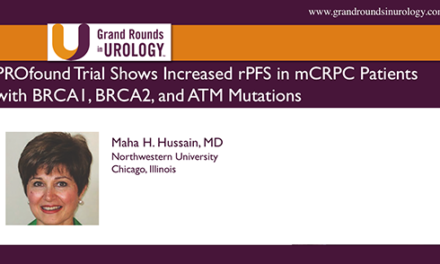Dr. Veda N. Giri, MD, presented “The Role of Genetic Testing for Inherited Prostate Cancer Risk” at the Philadelphia Prostate Cancer Consensus 2017.
The Role of Genetic Testing for Inherited Prostate Cancer Risk
Summary:
Dr. Veda N. Giri, MD, commenced the Philadelphia Prostate Cancer Consensus 2017 by explaining the purpose and need for creating updated, centralized guidelines regarding genetic testing for inherited prostate cancer.
She summarizes the scientific research advances since 1999 which prove the link between genetic mutations, especially BRCA and BRCA2. Also, researchers identified HOXB13 as the first hereditary prostate cancer gene. Then, Dr. Giri relates these scientific advances to a rise in clinical capabilities, such as next generation sequencing technology and prostate cancer multigene panel testing.
Presently, the state of knowledge and practices regarding genomics and prostate cancer is nebulous. Therefore, the urological community needs centralized, comprehensive guidelines to describe the proper approach for genetic testing for prostate cancer.
During the Philadelphia Prostate Cancer Consensus 2017, experts in urology, urologic oncology, and genomics aimed to finalize a draft for the guidelines.
Dr. Giri urged the conference members to focus on addressing the criteria for referring a patient, how is genetic counseling relevant to men at risk for prostate cancer, which genes to test, and how this informs the management of patients.
Up next: “The Burden of Prostate Cancer Today and in the Future” by Dr. Patrick Walsh, MD
ABOUT THE AUTHOR
Veda N. Giri, MD, is an Associate Professor in Medical Oncology and Cancer Biology at the Sidney Kimmel Cancer Center at Thomas Jefferson University in Philadelphia. She is a medical oncologist with a clinical and research interest in inherited cancer risk assessment. Dr. Giri is also the Director of Cancer Risk Assessment and Clinical Cancer Genetics at Thomas Jefferson University. Her clinical efforts are focused on the genetic evaluation of inherited risk for GU cancers, specifically prostate, kidney, and upper tract urothelial cancers. Her research studies encompass genetic characterization of cancer risk using sequencing technologies, molecular signatures, and novel biomarkers to ultimately reduce cancer-related morbidity and mortality. Her research also has a strong focus in cancer disparities. Dr. Giri received her medical degree from Jefferson Medical College, and proceeded to complete her Residency in Internal Medicine and Fellowship in Hematology-Oncology at the University of Michigan. She then completed advanced training in molecular cancer genetics at Fox Chase Cancer Center (FCCC). From 2006-2014, she directed prostate cancer risk assessment at FCCC, developing studies focused on evaluating the role of genetic markers in prostate cancer risk assessment. Dr. Giri has served on several national committees, including the National Comprehensive Cancer Network Prostate Cancer Early Detection Panel and NIH PDQ® Cancer Genetics Editorial Board, contributing expertise in cancer risk assessment and prostate cancer genetics.





